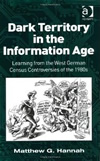Introducing Matthew Hannah
 Matthew G. Hannah is Professor of Human Geography at Aberystwyth University in Wales, UK. He specializes in historical and political geography, particularly in the spatial politics of state knowledge in the modern world. Professor Hannah, a native of Maryland, earned his BSc in Geography at the University of Maryland, and his MSc and PhD degrees at the Pennsylvania State University. He taught at the University of Vermont from 1994 until 2007, moving in that year to Aberystwyth.
Matthew G. Hannah is Professor of Human Geography at Aberystwyth University in Wales, UK. He specializes in historical and political geography, particularly in the spatial politics of state knowledge in the modern world. Professor Hannah, a native of Maryland, earned his BSc in Geography at the University of Maryland, and his MSc and PhD degrees at the Pennsylvania State University. He taught at the University of Vermont from 1994 until 2007, moving in that year to Aberystwyth.
This is the first part of the interview about the book “Dark Territory in the Information Age: Learning from the West German Census Boycotts of the 1980s”. The first part is Matthew Hannah: Information Age, Collective Action, Self-Determination, Citizenship
Interview
The boycott of the German census in the 1980s
Why did various groups in Germany oppose the national census in the 1980s?
 The specific trigger was a paragraph in the law passed for the 1983 census that set out extremely loose guidelines for the sharing of personal data from census returns between different state agencies.
The specific trigger was a paragraph in the law passed for the 1983 census that set out extremely loose guidelines for the sharing of personal data from census returns between different state agencies.
Activist groups involved in peace, nuclear and environmental issues at the time picked up on this in part because they were already facing quite intrusive and intimidating state surveillance in the public and organisational spaces through which they conducted their campaigns.
However, concern about the indiscriminate sharing of census data facilitated by the new electronic technologies spread well beyond the activist core quite quickly in the Spring of 1983. Many mainstream citizens and organisations began to declare their intent to support the proposed boycott, and national media began to explore the issue of the census’s impact on data protection in some depth.
Before the groundswell of boycott support could be put to the test, however, the Constitutional Court surprised everyone by temporarily halting the census in response to a lawsuit by two Hamburg attorneys, acknowledging that the larger constitutional implications of electronic information technology had not yet been adequately studied.
Eight months later, in December of 1983, the Court ruled that parts of the census law were in fact unconstitutional, and that the government had to return to the drawing board. This ruling not only became a watershed for data protection law throughout Europe but also set the stage for a more protracted and bitter boycott movement in 1987, when the government was again ready to count the people.
This time the count did go through, but the struggle became a stage for working through a wide range of unresolved tensions in West German politics, and for clarifying some key political dynamics peculiar to the then-nascent ‘information age’ (see below).
What role did Germany’s history (e.g. Nazi aggression, RAF terrorism) play in that regard?
The Nazi use of censuses and other official statistics in their pursuit of military and industrial expansion, and in organizing the mass murder of Jews, Sinti and Roma, and other ‘undesirables’, was recounted in much of the boycott literature.
Particularly important was research carried out by the historian Götz Aly with Karl-Heinz Roth for their 1984 book “Die restlose Erfassung”, now available in English translation (“The Nazi Census”). It is difficult to say with any precision how important the Nazi history was to individuals contemplating participation in the boycott, though it certainly did contribute to the general level of alarm.
Probably more central for many people, especially those under 30 years old, was their own personal experience of blanket suspicion and harassment by state security and police agencies. Since the mid-1970s, the escalating struggle of these agencies against the violent extremism of the RAF, the Movement of the 2nd of June and other groups had led them to treat many young people as potential ‘terrorists’ or at least ‘sympathisers’, thus alienated thousands from the state.
In this sense the RAF complex was anything but ‘historical’ at the time; it was still very current, not least because ongoing violence by later ‘generations’ of the RAF through the 1980s found an all-too-eager foil and willing co-escalator in the authoritarian Kohl governments of the period.
What strategies did the groups involved use to resist the census?
In 1983 there was no real consensus about how to carry out the boycott. Different boycott initiatives recommended everything from ‘accidental’ coffee spills on the census forms to political agitation in apartment buildings, to the so-called ‘hard boycott’.
The hard boycott involved clipping all identifying information off the forms and turning them in blank to ‘alternative collections points’, that is, local pubs, bookshops and cafes of the alternative ‘scene’. These collection points would then count the blank forms and return them to statistical offices in ‘recycling actions’.
A much better organised version of the hard boycott was adopted by most boycott initiatives in 1987, leading to the publication of running national totals of blank forms in a ‘boycott barometer’ during the enumeration. In both 1983 and 1987, another important strategy was to focus on the recruitment of enumerators. The hundreds of thousands of enumerators the state needed to carry out the census were often seconded from state agencies, with volunteers making up the balance.
But boycott initiatives urged those pressed to become enumerators to find grounds for refusal, to act as ‘Trojan enumerators’, knocking at doors not to collect information but to inform residents about the boycott, or indeed to sign up, go through the trainings and then quit just before the count, thereby crippling the census.
In 1987, enough enumerators were eventually found to carry out the count, but the rules had to be bent in some boycott hot-spots such as Hamburg and West Berlin. More broadly, demonstrations, public meetings, media editorials, petitions, in short, the whole panoply of protest methods, were brought into play.
The left-wing national daily ‘Die Tageszeitung’ was particularly active in coordinating both the 1983 and the 1987 movements. There were even some isolated incidents of violence, including the bombing of a survey office. A few enumerators were beaten and robbed of their census materials, leading to predictable but unsuccessful attempts by state officials to paint all boycotters as potentially violent.
In general, the Green Party, which had just attained seats in the Bundestag during the 1983 boycott movement, was a much more prominent player in 1987, when it could bring significant experience and resources to bear in helping the boycott initiatives coordinate their activities. Accordingly, the Greens were bitterly villified by state officials and census supporters.
Do you see parallels between the German census boycott in the 1980s and more recent demonstrations (e.g. Seattle, ‘Occupy’)?
Clearly there are parallels insofar as the boycotts involved organized events in public spaces. Relatively advanced police tactics, such as kettling and systematic photographing of crowds, were already in use in West Germany and West Berlin during the 1980s.
Demonstrators there were likewise among the most experienced and tactically sophisticated anywhere in the world at the time. Lacking mobile phone technology, though, their organizational toolkits did not match those of today’s protestors.
It is perhaps more interesting to note that the parallels between issues of anonymity in physical public spaces and anonymity in the virtual world of electronic information were already clear then. At the same time that boycotters were challenging the state’s ‘epistemic sovereignty’, its right to know everything about the people living within its borders, struggles raged in the streets and courtrooms over whether protestors should be allowed to cover their faces and wear improvised armour (motorcycle helmets, etc.).
The right to see faces and to coerce or injure bodies, like the right to gather personal data and use it to coerce compliant behaviour, were explicitly seen as part of the emergence of what Hamburg activists called ‘cybernocracy’.
In the Occupy movements of today, these links remain clear, even if the strategic and tactical struggles have moved into new areas, for example in protestors’ use of their own camera drones to track police movements.
Why did you decide to write a book about the German census boycott and what do you hope to achieve by it?
The original idea had been to extend the historical research I had done on the modernization of the US census in the 19th century by looking at a case study in which the political dimensions of state knowledge-gathering were actively and explicitly challenged.
This was motivated to some extent, though not chiefly, by an issue that had been nagging me for some time. In much of my work I had drawn quite heavily (if in what I would call a ‘respectfully disrespectful’ way) upon the writings of Foucault on power relations. Like many others who have made use of Foucault’s work, I had grown increasingly irritated by the widely parroted notion that his analyses encourage political quietism.
The West German census boycotts seemed to show how critiques of power/knowledge quite close to Foucault’s could feed directly into real political struggle. To be clear, I don’t believe Foucault’s political optic is adequate across the board as an anchor for political struggle against oppression and injustice.
I am convinced that it has to be articulated with a Marxist analysis of capitalism and a feminist approach to gender politics in their intersection with other dimensions of oppression. How to do that is a difficult question, but one worth pursuing.
That said, the West German boycotts certainly do at least show some of the (inherently geographical) ways in which what Foucault called the ‘biopolitics of populations’ can be targeted in political struggle. As the research advanced, however, all of these issues centered in political theory receded into the background.
The story that was gradually emerging as I pieced together events from the archival materials was fascinating on its own terms, and I began to see in this material the lineaments of a new form or mode of citizenship that will only grow more pertinent as the 21st century wears on (see below).
I had had no intention when I started out of writing anything about ‘citizenship’, but this was one of those important moments when research materials steer the researcher.
